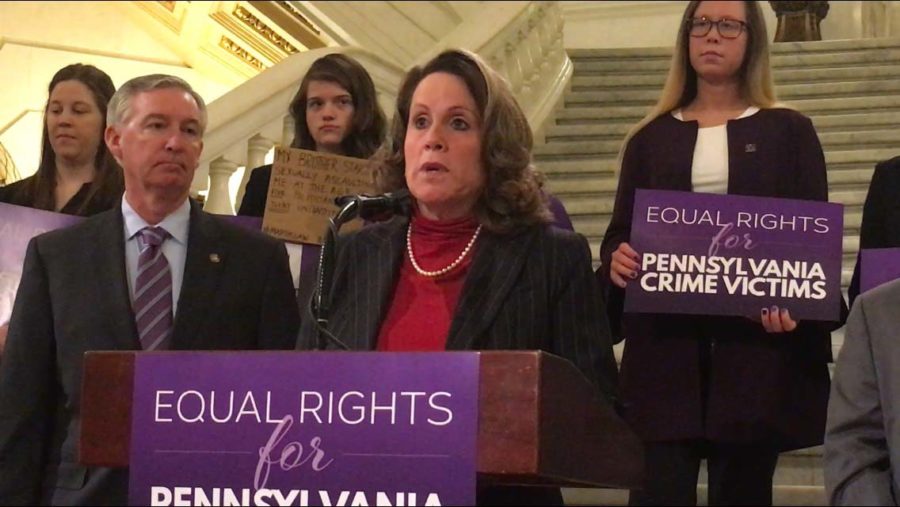Votes for controversial Pa. ballot initiative Marsy’s Law may not be counted
Rep. Sheryl Delozier, R-Cumberland, was among those who spoke at a Capitol news conference about a proposed constitutional amendment, dubbed Marsy’s Law, that would give crime victims constitutionally protected rights.
November 4, 2019
While visiting the polls Tuesday, Pennsylvanians will vote on a referendum known as Marsy’s Law — but it is unclear if the votes will be counted.
The referendum asks voters whether they approve or reject a series of state constitutional amendments that would give victims of crimes “co-equal rights to the accused.” Marsy’s Law, if approved, would provide crime victims the ability to be notified of release or escape of the accused. In addition, they will be able to refuse an interview, deposition or other discovery request made by the accused and to be heard at proceedings where the right of the victim is implicated, including release, sentencing and parole hearings.
Pennsylvania Commonwealth Court Judge Ellen Ceisler issued an injunction last Wednesday preventing the counting or tallying of votes on the referendum until a ruling has been made in the standing lawsuit League of Women’s Voters of PA and Haw v. Boockvar.
Lorraine Haw, a member of the Coalition for a Just District Attorney and the Coalition to Abolish Death by Incarceration, as well as the League of Women’s Voters, a nonpartisan political advocacy group seeking to inform voters on reform issues, filed the suit against the state’s ballot measure on Oct. 10.
They claimed that the ballot measure proposed several amendments to Pennsylvania’s constitution, violating Article XI, which states that “when two or more amendments shall be submitted they shall be voted upon separately.”
Acting Pennsylvania Secretary of State Kathy Boockvar, the case’s defendant, said in response that the ballot measure contains related subparts that pertain to a single subject, making it constitutional.
Pennsylvania Attorney General Josh Shapiro filed an appeal Friday afternoon in response to the injunction, according to an email from the attorney’s general spokesperson, Jacklin Rhoads.
Marsy’s Law was ruled unconstitutional in the state of Montana in 2017 for the same separate-vote issue that is currently being tried in the Pennsylvania case.
The original intention of the lawsuit was to prevent the initiative from making it onto the ballot in the first place. But some officials, including Allegheny County District Attorney Stephen Zappala, argue it is too late for the referendum to be removed. Zappala filed a petition to intervene with the Commonwealth Court on Oct. 11, requesting that his office be allowed to help defend the case.
“As the Chief Law Enforcement Officer of Allegheny County, your petitioner has the duty and obligation to protect the victims of crime,” the petition said. “The purpose of this proposed amendment is to protect the rights and security of victims of violent crimes, and their families.”
Marsy’s Law has support from top Democrats across the Commonwealth, including Gov. Tom Wolf, Sen. Bob Casey and Shapiro. Wolf released a statement of support for the amendment in April 2018.
“It is important for us all to reflect on how we can improve the lives of crime victims in Pennsylvania,” Wolf said. “Marsy’s Law will amend the state constitution to provide crime victims with equal protections and participation in the process. Victims and their families deserve equity.”
Marsy’s Law for All — a group established to enact constitutional rights for crime victims in all 50 states — was established in 2009 by Dr. Henry Nicholas after the first version of Marsy’s Law passed in California in 2008.
Nicholas sponsored the original law in response to his sister Marsy’s death. Marsy Nicholas was murdered by her ex-boyfriend in 1983 while attending University of California Santa Barbara. Dr. Nicholas and his mother were upset when they later ran into Marsy’s muderer at the grocery store after he had been released on bail, before he had been convicted of the crime.
Supporters of the amendment have framed Marsy’s Law as a victims’ rights measure that would guarantee crime victims’ rights in the same way the accused are granted rights. But Andy Hoover, a spokesperson for the ACLU of Pennsylvania, said the amendment appeals to “our sense of fairness” while misunderstanding why there are constitutional protections for those accused of crime in the first place.
“When a person has been accused of a crime they are facing the full force of the government, the government could be trying to incarcerate them, take property from them or maybe even execute them,” Hoover said. “It’s an incorrect comparison to compare an accused person to a victim of a crime because the person who is accused has to face the government and all of its power.”
According to Hoover, some of the 15 provisions that would be added to the constitution are “particularly problematic,” specifically those that would establish an individual as a victim of a crime, entitling them to certain rights in criminal proceedings, before the accused is convicted.
Hoover, and the ACLU at large, believe that this violates what is known as due process. Due process, granted to citizens by the Fifth Amendment of the U.S. Constitution, is meant to ensure fair treatment within the criminal justice system.
“One of our foundational values is that someone is ‘innocent until proven guilty,’” Hoover said. “if you establish a person as a victim in court, before there is even a conviction, that flips the presumption to ‘guilty until proven innocent.’”
Hoover added that parts of the referendum could potentially be beneficial, but should be considered in a separate vote. He agreed with the League of Women’s Voters position that it is unfair for voters to decide on all of these constitutional changes at once.
“A voter might like some parts of Marsy’s Law and not like other parts, but the way that the amendment is written, the voter has to vote yes or no on the whole thing,” Hoover said. “Had the legislature done this properly, an individual would be able to vote on the individual pieces, instead of being forced to accept or reject the law in its entirety.”




